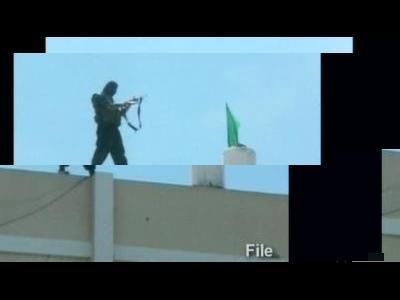 Play Video Mideast Video:Palestinians consider election call Reuters
Play Video Mideast Video:Palestinians consider election call ReutersJERUSALEM – Egyptian President Hosni Mubarak's downfall appears to have nudged Israel and the Palestinians toward some common ground: Neither side seems to think now is the time for brave moves toward peace.
For Israel, Mubarak's departure has left behind an all-consuming worry that the influence of Islamic extremists will grow, and the two countries' historic 1979 peace treaty could be in jeopardy. For the Western-backed Palestinian leadership, the fall of Egypt's strongman deprives them of a key mediator with the Israelis and — just as crucially — with their Palestinian rivals in the militant Islamic Hamas movement.
Both sides are now waiting to see what kind of Egyptian government emerges in Mubarak's wake. It's one more distraction preventing Israelis and Palestinians from reviving a U.S.-backed peace push that ground to halt only weeks after it started last year.
The Palestinians were already reeling from last month's leaks to Al-Jazeera TV disclosing that they had offered deep concessions to Israel in past peace talks. The revelations triggered public outrage. Hoping to diffuse the anger on the street, the Palestinians are now focused on moving ahead with long-delayed elections.
One Palestinian official said that with both sides preoccupied and disillusioned it was once again up to America to push for peace.
"When it comes to the Palestinian people, this is a test for the Americans," said Hanan Ashrawi, a member of the top Palestinian decision-making body, the Palestine Liberation Organization's executive committee. "They must understand it's a critical issue."
She said that just as President Barack Obama ultimately sided with the Egyptian protesters who brought down Mubarak, he should change what is viewed by the Palestinians as an unfair pro-Israel bias.
Obama made Mideast peace a top priority upon taking office two years ago, believing that resolving the Israeli-Palestinian conflict would remove a major source of tension in the region. He personally presided over the relaunch of peace talks at the White House last September, pledging to forge an agreement within one year.
The talks broke down just three weeks later with the expiration of an Israeli slowdown on settlement construction, and Obama's September target for an agreement has since appeared increasingly unrealistic. The Palestinians say there can be no good-faith negotiations if Israel continues to build settlements on the occupied lands they claim for a future independent state.
Palestinian officials claim that even with the Middle East in turmoil, Israeli settlement construction remains the top obstacle to peace.
"Any negotiations with Israel now, while the settlement-building continues, will be a political delusion," said Yasser Abed Rabbo, a top aide to Palestinian President Mahmoud Abbas.
But the U.S.'s inability to coax Israel into a settlement freeze is just one of the issues dogging peace efforts.
The Palestinians are still recovering from last month's leak of dozens of sensitive negotiating documents to the Al-Jazeera satellite channel, and the Egyptian unrest continues to ripple throughout the region.
The Al-Jazeera documents, which showed that Abbas and other top officials were amenable to key concessions to Israel during failed peace talks in 2008, deeply embarrassed the Palestinian leader and over the weekend compelled his chief negotiator, Saeb Erekat, to resign.
Analysts say Abbas, seen as weak by the Palestinian public, would have a hard time presenting the resumption of negotiations to his people in the current environment.
On Saturday, pushed by both the Al-Jazeera leaks and the events in Egypt, Abbas' government said it would hold long overdue general elections by September.
Abbas has repeatedly delayed elections, both due to fears that his Fatah Party would lose, and because of the geographical split in Palestinian society.
Abbas governs from the West Bank while the rival Hamas militant group rules the Gaza Strip, having taken it over by force in 2007. The Palestinians hope to turn both territories — located on opposite sides of Israel — into a state. Elections could conceivably provide a way for the rivals to reconcile, though Hamas has said it will boycott the vote.
In the absence of peace talks, Abed Rabbo said the Palestinians would spend the coming months preparing for the elections, pursuing reconciliation and trying to rally international support for Palestinian independence at the United Nations. They have set September as an informal target date for declaring statehood, with or without a peace deal.
For Israel, the reluctance to resume talks is far more straightforward.
Mubarak's downfall has robbed Israel of a key ally and raised concerns that the radical Muslim Brotherhood could play a role in a future Egyptian government. The Egyptian army's pledge on Saturday to preserve a bedrock peace treaty with Israel helped ease fears, but jitters remain.
At a time of such great uncertainty, Israeli officials are highly reluctant to turn over full control of territory on their doorstep to Abbas, a man they view as well-intentioned but weak.
Just as Abbas' forces lost control of Gaza to Hamas, they fear the same thing could happen in the West Bank — a scenario that would put a hostile group just a few miles from the country's largest cities.
"In our pursuit of peace, we have to ensure that there are rock-solid security arrangements, both to protect the peace ... but also to reflect the fact that reality can change tomorrow," Prime Minister Benjamin Netanyahu declared in a speech last week.
Some, however, took the view that in the long run, the changes under way in the region could boost prospects for peace.
"The good thing could be that we see more democratic regimes here, and a democratic regime is more stable and more likely perhaps to conclude peace agreements," said Eytan Gilboa, an analyst at Bar-Ilan University near Tel Aviv.
___
Mohammed Daraghmeh in Ramallah, West Bank, and Aron Heller in Jerusalem contributed to this report.
http://news.yahoo.com/s/ap/20110213/ap_on_re_mi_ea/ml_israel_palestinians_peace_later
No comments:
Post a Comment